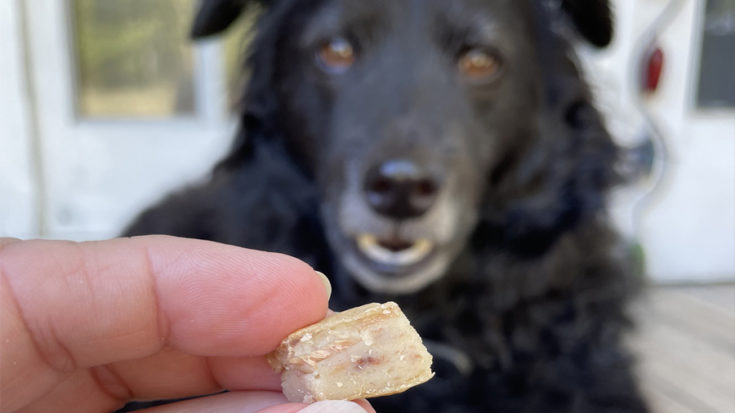Can Dog Breeds Eat Fudge?
No, dogs should not eat fudge. Fudge is a type of candy that typically contains sugar and dairy products like butter or cream cheese, which can be difficult for dogs to digest. The high amount of sugar in fudge can also lead to an upset stomach or diarrhea if eaten by a dog.
Additionally, some people make homemade fudges with ingredients that are toxic to dogs such as chocolate, raisins, nuts and xylitol (an artificial sweetener). Therefore it is best to keep any kind of fudge away from your pup!
How Much Fudge is Toxic to Dogs?
The amount of fudge that is toxic to dogs varies depending on the size and breed of the dog. Generally speaking, small amounts of fudge are not likely to cause serious harm to a healthy adult dog, however larger amounts can be dangerous.
Dogs have sensitive digestive systems and so too much sugar or fat in their diets can lead to obesity, diabetes or pancreatitis. Fudge also contains large quantities of chocolate which is a known toxin for dogs; dark and/or bitter chocolates containing cocoa powder pose an even greater risk as they contain higher levels of theobromine which can be deadly in high doses.
If your pet has consumed any quantity of fudge it’s important that you seek veterinary attention immediately as some signs may take up to 24 hours after ingestion before they become apparent. It’s best practice to keep all sweet treats out of reach from pets at all times – this rule applies especially when it comes to fudge!
Symptoms to Watch For Dogs if Eat Fudge
If a dog consumes fudge, it can potentially lead to various symptoms and health issues due to the ingredients in fudge, which typically include chocolate, sugar, and often dairy products. Chocolate, in particular, is toxic to dogs. Here are the symptoms to watch for if a dog eats fudge:
- Vomiting: One of the initial signs of chocolate toxicity in dogs is vomiting. If a dog consumes fudge containing chocolate, they may vomit as their body tries to rid itself of the toxic substance.
- Diarrhea: Diarrhea is another common symptom of chocolate ingestion in dogs. It often accompanies vomiting and is a result of the gastrointestinal irritation caused by the chocolate.
- Increased Heart Rate: Chocolate contains theobromine and caffeine, both of which can stimulate the dog’s heart and lead to an elevated heart rate (tachycardia). Increased heart rate is a concerning symptom and should be taken seriously.
- Restlessness and Hyperactivity: Dogs that have ingested chocolate may become restless, anxious, or hyperactive. They may exhibit signs of nervousness or agitation.
- Tremors or Seizures: In severe cases of chocolate toxicity, dogs can experience tremors or seizures. These are critical signs and require immediate veterinary attention.
- Increased Thirst and Urination: Chocolate can also lead to excessive thirst and urination in dogs, as it affects the kidneys.
- Muscle Rigidity: Some dogs may experience muscle rigidity or stiffness, particularly in the early stages of chocolate poisoning.
- Rapid Breathing: Increased respiratory rate (rapid breathing) can be a symptom of chocolate toxicity as the dog’s body attempts to compensate for the stimulant effects of chocolate on the cardiovascular system.
- Elevated Body Temperature: Chocolate toxicity can lead to a rise in body temperature (hyperthermia), which is dangerous for dogs, especially if it becomes severe.
It’s important to note that the severity of symptoms can vary depending on the amount and type of chocolate ingested and the size and sensitivity of the dog. Dark chocolate and unsweetened baking chocolate have higher theobromine content and are more toxic than milk chocolate.
Can Dogs Eat Caramel Fudge?
No, dogs should not eat caramel fudge. Caramel is a type of candy made from sugar and butter, which can be toxic to dogs if consumed in large quantities. Chocolate, which is often added to caramel fudge recipes, contains theobromine and caffeine – both of which are toxic to canines.
Additionally, caramel fudge likely contains ingredients such as milk or cream that may cause an upset stomach or other digestive issues for your pup. To keep your dog safe and healthy it’s best to avoid giving them any kind of sugary treats like caramel fudge altogether.
Does Fudge Have Chocolate in It?
Yes, fudge typically contains chocolate. Fudge is a type of confectionery made with sugar, milk, butter and cocoa powder that is boiled until it reaches a thick consistency. It can be flavored with ingredients like vanilla extract or nuts, but traditional recipes usually rely on the combination of these four main ingredients to create its signature texture and flavor.
The addition of cocoa powder gives the fudge an unmistakable chocolatey taste and dark color, making it one of the best-loved treats around. For those who prefer their fudge without any chocolatey goodness however, there are plenty of alternative flavors available that don’t contain any cocoa powder – including peanut butter, mint and even marshmallow!
Can Dogs Eat White Fudge?
The answer to this question is a bit more complicated than it may seem. While dogs can eat white fudge, it’s important to remember that too much sugar isn’t good for them. White fudge contain high amounts of fat and sugar, which could potentially be bad for your dog if they consume too much of it.
Additionally, certain kinds of white fudge may contain ingredients such as nuts or chocolate chips that are toxic to dogs in large quantities. So while the occasional treat won’t hurt your pup, you should avoid feeding them large amounts of sweet treats like white fudge on a regular basis. Remember: moderation is key when choosing snacks for your four-legged friend!
Can Dogs Eat Vanilla Fudge?
Yes, dogs can eat vanilla fudge in small amounts. However, it is important to remember that many store-bought varieties of vanilla fudge contain a lot of added sugar and other ingredients which may not be suitable for your pet’s health. Therefore it is best to consult with your veterinarian before giving any type of human food to your dog.
If you do decide to feed them some homemade vanilla fudge, make sure that the recipe does not include any ingredients such as xylitol or chocolate which are toxic for dogs.
Can Fudge Kill a Dog?
No, fudge cannot kill a dog. The ingredients in fudge are not toxic to dogs, however it is important to monitor the amount of sugar and fat that your pup consumes as part of their diet. Too much sugar or fat can lead to health problems such as obesity and diabetes, so only feed your pup small amounts of treats like fudge occasionally.
Can Dogs Eat Non Chocolate Fudge?
Yes, dogs can eat non-chocolate fudge as long as it is made with non-toxic ingredients such as sugar, butter and milk. However, it’s important to limit portion size since too much of anything can be bad for a dog’s health.
Additionally, make sure to avoid any other ingredients that may be toxic to your pup – like nuts or raisins – and always consult with your veterinarian before giving them any type of treat.
Conclusion
In conclusion, fudge should never be given to dogs as it can cause serious health issues due to its high sugar content. While there may not be any immediate harm from giving your pup a small amount of fudge occasionally, it is best to avoid it altogether in order for them to remain healthy and happy.
If you’re looking for a treat that’s safe for your canine companion, look no further than specially designed dog treats which are made specifically with their dietary needs in mind.



